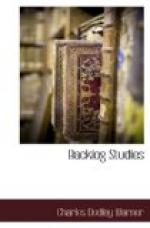IV
The fireplace, as we said, is a window through which we look out upon other scenes. We like to read of the small, bare room, with cobwebbed ceiling and narrow window, in which the poor child of genius sits with his magical pen, the master of a realm of beauty and enchantment. I think the open fire does not kindle the imagination so much as it awakens the memory; one sees the past in its crumbling embers and ashy grayness, rather than the future. People become reminiscent and even sentimental in front of it. They used to become something else in those good old days when it was thought best to heat the poker red hot before plunging it into the mugs of flip. This heating of the poker has been disapproved of late years, but I do not know on what grounds; if one is to drink bitters and gins and the like, such as I understand as good people as clergymen and women take in private, and by advice, I do not know why one should not make them palatable and heat them with his own poker. Cold whiskey out of a bottle, taken as a prescription six times a day on the sly, is n’t my idea of virtue any more than the social ancestral glass, sizzling wickedly with the hot iron. Names are so confusing in this world; but things are apt to remain pretty much the same, whatever we call them.
Perhaps as you look into the fireplace it widens and grows deep and cavernous. The back and the jambs are built up of great stones, not always smoothly laid, with jutting ledges upon which ashes are apt to lie. The hearthstone is an enormous block of trap rock, with a surface not perfectly even, but a capital place to crack butternuts on. Over the fire swings an iron crane, with a row of pot-hooks of all lengths hanging from it. It swings out when the housewife wants to hang on the tea-kettle, and it is strong enough to support a row of pots, or a mammoth caldron kettle on occasion. What a jolly sight is this fireplace when the pots and kettles in a row are all boiling and bubbling over the flame, and a roasting spit is turning in front! It makes a person as hungry as one of Scott’s novels. But the brilliant sight is in the frosty morning, about daylight, when the fire is made. The coals are raked open, the split sticks are piled up in openwork criss-crossing, as high as the crane; and when the flame catches hold and roars up through the interstices, it is like an out-of-door bonfire. Wood enough is consumed in that morning sacrifice to cook the food of a Parisian family for a year. How it roars up the wide chimney, sending into the air the signal smoke and sparks which announce to the farming neighbors another day cheerfully begun! The sleepiest boy in the world would get up in his red flannel nightgown to see such a fire lighted, even if he dropped to sleep again in his chair before the ruddy blaze. Then it is that the house, which has shrunk and creaked all night in the pinching cold of winter, begins to glow again and come to life.




